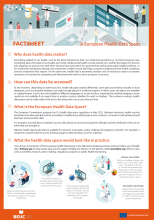
Latest News
Logo
Available in
English
Available in
English
A survey across eight European countries shows that consumers are more cautious about sharing their health data than legislation currently under discussion at EU level proposes. The findings underline that EU legislators urgently need to better reflect people’s preferences in the European Health Data Space Regulation which is already under discussion by the EU institutions. This is essential for people to feel confident about sharing their health data to improve healthcare provision and make their data available for research and public health purposes.
Available in
English
Available in
English
The European Commission proposals published today to reform the EU’s medicines and pharmaceutical legislation are a good step in the right direction by moving the EU into a more active role to address numerous market failures. However, set against a backdrop of fairly widespread medicine shortages and increasing pressure on state budgets to reimburse people’s medicines, these proposals will have to go further to resolve the problems.
Available in
English
Available in
English
Europe is undergoing a ‘perfect storm’: the rising energy prices, only partly linked to the Russian invasion of Ukraine, and its implications on other sectors (food, chemicals, pharmaceuticals, products, and services linked to energy-intensive production) led to heavy inflation. While salaries remain in most countries stable, prices are skyrocketing and supply chains are being disrupted, generating among many consumers major worries about their short-term future.
Therefore, it is crucial to identify and roll out measures to address or mitigate the effects of the cost-of-living crisis for consumers. These measures call for action by different stakeholders, be they market players or policy makers. They also have different timelines and need to be targeted depending on the specific needs of certain population segments
Therefore, it is crucial to identify and roll out measures to address or mitigate the effects of the cost-of-living crisis for consumers. These measures call for action by different stakeholders, be they market players or policy makers. They also have different timelines and need to be targeted depending on the specific needs of certain population segments
Available in
English







